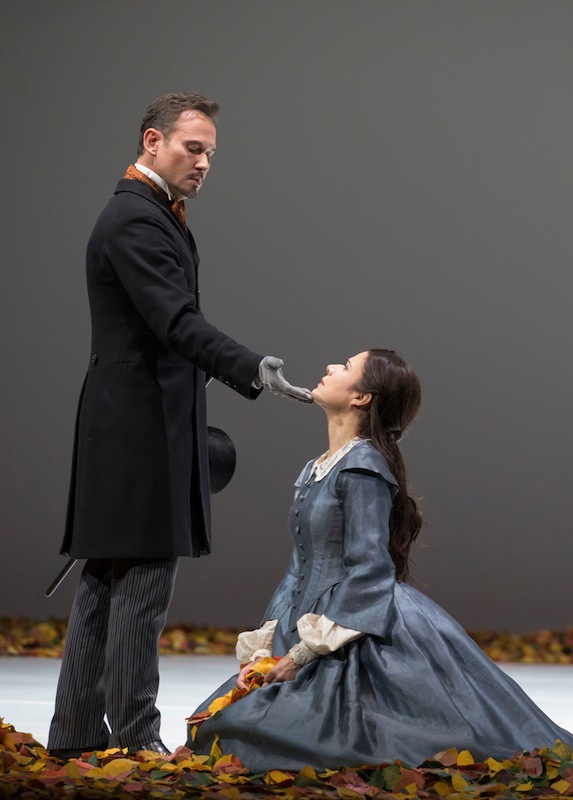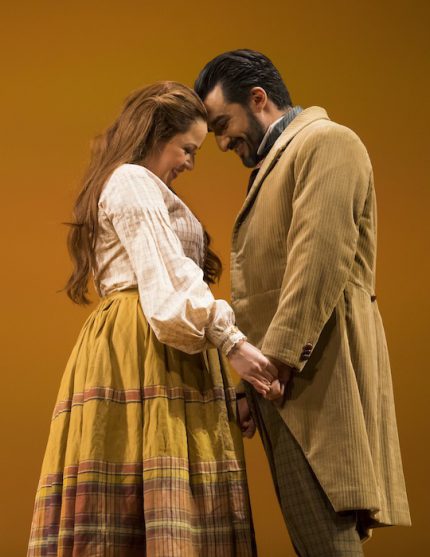Lyric Opera wraps the season with a compelling, visually striking “Onegin”

With the soothing regularity of presidential tweets, the weather in Chicago this past week has swung from a springlike 72 degrees down to the 30s and snow within hours. That reprise of the standard February winter chill set the scene nicely, however, for Tchaikovsky’s Eugene Onegin, which opened Sunday afternoon at Lyric Opera.
In this final opera production of Lyric’s 2016-17 season, the company has revived the Met’s Robert Carsen staging for the tale of the amoral title nobleman, who coldly rejects the young Tatiana’s girlish love only to regret it when faced years later with his own soulless existence.
Lyric’s production delivered the Russian goods idiomatically and in fine style with a largely inspired cast and an effective, imaginative production, closing its season on a positive note.
It’s rare for a major house to book the same artist for a principal role in back-to-back productions. But when the singer is Mariusz Kwiecien in his signature role of Onegin, who is going to complain?
Poised and aristocratic of bearing, the Polish baritone wholly embodied the aloof and cynical Onegin. Despite a somewhat husky undertone at times, Kwiecien showed why he is the leading exponent of the title role–wielding his saturnine baritone like a stiletto, elegant of movement and always vocally and dramatically effective even when Onegin’s repeated avowals of love in the final scene stretch credulity.
Ana Maria Martinez is clearly a favorite of Lyric management these days. But her uneven debut performance as Tatiana couldn’t help but make one feel that this was another case of a miscast principal at Lyric dragging down an otherwise excellent production.
While Martinez’s singing was proficient and technically solid, her anodyne soprano brought little nuance to the famous Letter Scene, which was short-breathed, expressively bland and underpowered at the climax. Dramatically, she was more convincing as the bourgeois society matron of the final act than the vivacious young girl of the early going, and Martinez delivered her best singing of the evening with Kwiecien in their final scene. Still, one feels this is not a role suited to her either vocally or dramatically, and one continues to wonder about Lyric’s trend toward casting favored singers in untested roles.
As Lensky, Charles Castronovo built on the positive impression of his 2011 Lyric debut in The Magic Flute. The New York native fully conveyed the character of the earnest young poet whose obsessive love for the flighty Olga leads to tragedy (with Onegin’s maniplation). He brought impassioned singing to the role throughout with an ardent rendering of Lensky’s Act 2 aria that was simply sensational. Rich of tone, stoic without self-pity, and beautifully sung, it justifiably received the most enthusiastic ovation of the afternoon.
Alisa Kolosova made a most impressive American opera house debut as Olga. Singing with a lustrous, liquid voice, the Russian mezzo-soprano was ideal in this role, singing with youthful ease throughout and embodying Tatiana’s flirtatious younger sister as completely as Kwiecien did Onegin.
The well-traveled Met production strips away the opera’s usual sumptuous ballrooms and upper-class interiors for an imaginative minimalist staging by Michael Levine. The Lyric stage is empty except for a table and four towering bare trees in the opening scene and only minimal furniture throughout. Leaves cover the vacant stage and the high bare walls on all sides are evocatively lit to suggest autumn, evening and morning. The stark emptiness suggests something of the cold and forbidding Russian expanse, as well as the isolation and loneliness of the main characters. Christine Binder’s painterly lighting, with effective use of silhouettes, was unfailingly atmospheric and frequently stunning.
It was luxury casting indeed to have Jill Grove portray Filipyevna. The wonderful mezzo’s big voice and roundly characterized performance as Tatiana’s nanny showed that there are indeed no small parts, just small singers.
Dmitri Belosselskiy brought his subterranean bass and an apt military bearing to the role of Prince Gremin, singing of his love for Tatiana with honest, dignified expression.
Katherine Goeldner was a serviceable Larina, Takaoki Onishi a vocally imposing Captain, Patrick Guetti, a sonorous Zaretsky. As Triquet, tenor Keith Jameson made a delightful character turn with his self-conscious paean to Tatiana.
Alejo Pérez made an admirable debut in the pit. At times one wanted more tautness at the ends of phrases, but the lyric intimacy of the opera appeared to suit the Argentinian conductor’s legato style, and he led a flowing and idiomatic account of Tchaikovsky’s melodious score.
The Lyric Opera Chorus has logged a lot of stage time in the final months of this season. Yet no fatigue was evident Sunday as Michael Black’s ensemble brought robust and vital corporate vocalism to theor roles of guests and villagers.
Taking the wheel for Carsen, revival director Paula Suozzi showed a seasoned and sensitive touch, welcome in a house where heavy-handed interventionism is increasingly the norm. The difficult final scene between Tatiana and Onegin proved awkward in places and clearly still needs some blocking work. But for the most part Suozzi finessed the myriad staging minefields of this alternately intimate and overwrought domestic drama.
Eugene Onegin runs through March 20. lyricopera.org: 312-827-5600.
Posted in Performances



Posted Feb 28, 2017 at 10:27 am by Ned R. Turner
I think that a definition of Minimalist means that a company is putting on an opera on the cheap. For Lyric, it means that less scenery will allow for one intermission, rather than two. Watch the DVD of Evgeny Onegin as done by the Kirov Opera. One can see how the décor helps bring this opera to its fullest, as Tchaikovsky intended.
Posted Mar 01, 2017 at 11:03 pm by frank Oliva
A disgrace. A destruction of Tchaikovsky’s masterpiece. The choreography was simply non existent. The waltz at the end of the second act should have been the opening of the third act. Instead we have some morons moving chairs and Onegin being dressed on stage.
Opera is the music and the settings. There were no settings, only absurdity in an insane level.
Lyric is really going down the tube. Peter is probably turning in his grave. The cast prostituted themselves by allowing to participate in this charade. This was not an opera. It was a disgrace.
Posted Mar 02, 2017 at 4:09 pm by John Plampin
Definitely needs the ballet. We need the contrast between country and great city . . .
And probably cost them almost as much to do anyway, so why not do it right?
Posted Mar 09, 2017 at 6:21 pm by Gary D.
Dear frank (sic). I imagine it took you a long time to write your post down in your parent’s basement. Yes! The Lyric certainly is going down the tube. I actually saw 4 empty seats in the house that night. By the way, do you actually have a lower case f for your first name?
Posted Mar 15, 2017 at 12:41 am by Larry Lapidus
I was at the performance of Eugene Onegin tonight. It was wonderful. The minimalist staging put the emphasis on the characters. Thus we were able to focus on great singing too. The production is 10-15 years and is a second time around for Lyric. Smart to bring back something worthwhile. Great way to end the season!